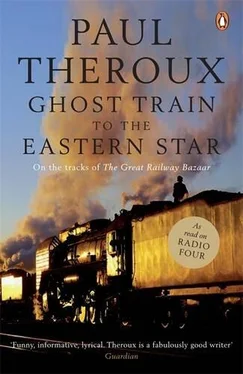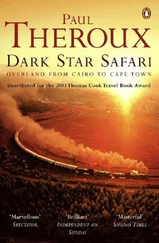Yet this apparent familiarity, one of the powerful attractions of Paris, is an illusion. " Couleur locale has been responsible for many hasty appreciations," Nabokov once wrote, "and local color is not a fast color." The brilliant Parisian stage set has a long history of insurrections, mob violence, unrest, and the extreme humiliation of foreign occupation — in the experience of many Parisians alive now, the memory of Germans in charge, the betrayals, the shame of surrender. Once a city's boulevards have been marched by triumphant Nazis, they never look quite so grand again. Like many of its decorous women, Paris, while appearing inviolate, has had a turbulent past, been raped and pillaged and bombed and besieged, and has gone on changing, like its sister city, London, and the other cities on my itinerary: Vienna, Budapest, Bucharest, Istanbul, Ankara, Tbilisi, Baku, and the rest of the glittering anthills of Asia, as far as Tokyo.
I seldom feel uplifted in a city; on the contrary, I feel oppressed and confined. In my travels I have been more interested in the places that lay between the great cities than the cities themselves: the hinterland, not the capital. It is my suspicion that people who are glamoured by big cities and think of themselves as urbane and thoroughly metropolitan are at heart country mice — simple, fearful, overdomesticated provincials, dazzled by city lights.
So the car burnings of a month before and the present crisis in Paris were revelations. I don't believe in the immutability of cities. I think of them generally as snake pits, places to escape from. But this manifestation —a huge noisy mob at (so the smiling man had told me) the Place de la République — had brought the city to a halt. Perhaps something to see — certainly a rowdy mob was more of a draw than anything I might look at in the Louvre.
I found a taxi. The driver was sitting comfortably, listening to the radio, his chin resting on his fist.
"Place de la République," I said, getting into the car.
"Not easy," he said. "It's the manifestation. "
"What's the problem?"
"They're angry," he said, and he mentioned the debonair prime minister, who wrote and published his own poetry, and who wanted to change the labor laws.
More minutes passed, during which the driver made a call on his cell phone. Predictably, he reported that he was stuck in traffic.
"Also, it's raining."
Recognizing a fellow taxi driver, he leaned out the window and began bantering. Then he interrupted himself, saying to me, "And there's road-work on the Boulevard Saint-Germain."
When we had gone nowhere and the meter showed 10 euros—$13, for about fifty yards — I said, "Then I think I'll go to the Gare de l'Est."
"Better to walk there — it's just past that street and down some steps."
I got out, walked back to the Gare du Nord, bought a newspaper, and saw signs to the Gare de l'Est. Crossing the street, I was distracted by a pleasant-looking restaurant, the Brasserie Terminus Nord, the sort of warm, well-lighted, busy eatery that made me hungry on this cold wet day.
I told myself that this was a farewell meal, and ordered a half bottle of white burgundy, salad, and bouillabaisse marseillaise —a big bowl of fish, mussels, large crabs, small toy-like crabs, and prawns in a saffron-tinted broth, with croutons and rémoulade. The waiters were friendly and went about their business with eficiency and politeness and good humor.
Noticing my bag, one said, "Taking a trip?"
"Going to Istanbul. On the train." And I thought: Also Turkmenistan and Uzbekistan and onward…
"Nice trip."
"To Budapest tonight, then tomorrow night to Romania. I have a question." I tapped the newspaper. "What is the meaning of licenciement? "
"It means losing your job."
"That's what the manifestation is about?"
"Exactly."
He explained: The prime minister proposed changing the law to make it easier to fire workers who, in France, had jobs for life, since firing them was almost impossible. But the young people had risen up against the change — as did the unions, the communists, and workers generally, because job security was considered sacred. If French jobs were not protected (it was argued), they would be taken by immigrant Poles and Al-banians, leaving the social order in tatters and cultural life under siege by foreigners.
I finished my meal, talked with the waiters, and made a few notes. From these few hours in France I could conclude that French waiters are friendly and informative, French food is delicious, French taxi drivers have a sense of humor, and Paris is rainy. In other words, generalize on the basis of one afternoon's experience. This is what travel writers do: reach conclusions on the basis of slender evidence. But I was only passing through; I saw very little. I was just changing trains en route to Asia.
I continued on my way, walking to the Gare de l'Est, found a steep old staircase that was cut into the slope of the narrow road. A stenciled sign in French on the pavement said, The greatest danger is passivity.
Inside the station, at the far end of this road, a milling crowd with upturned faces searched the departure board for platform assignments. I saw my train listed — to Vienna. This information was confirmed by a voice on the loudspeaker: " Platform nine, for the Orient Express to Mulhouse, Strasbourg, and Vienna "
My train was called the Orient Express? I was surprised to hear that. All I had was a set of inexpensive tickets: Paris-Budapest-Bucharest-Istanbul, necessitating my changing trains in each city, three nights on sleeping cars. There are two ways by train to Istanbul — my rattly roundabout way, on three separate trains, and the luxurious way. It so happened that the luxury train was at an adjacent platform, its sleeping cars lettered Compagnie Internationale des Wagon-Lits, a grand sendoff, with an old-fashioned limo parked on the platform lettered Pullman Orient Express — pour aller au bout de vos rêves (to take you to the limit of your dreams).
This waiting train, which was not my train, was the sumptuous, blue and gold Venice Simplon-Orient-Express, which had run from Paris to Istanbul from 1883 until 1977. It was a ghost of its former self (one sleeping car, no dining car, grouchy conductor) when I took it in 1973, and it was canceled altogether four years later. Its rusted and faded carriages were offered at auction in Monte Carlo, and all of them, all its rolling stock, bought by an American businessman. He plowed $16 million into restoring the coaches and bringing back the luster. He bought a version of the name, too, and restarted this luxury train in 1982. It has been a success with the nostalgic rich.
It was not my train because, one, it was too expensive: it would have cost me around $9,000, one way, from Paris to Istanbul. Reason two: luxury is the enemy of observation, a costly indulgence that induces such a good feeling that you notice nothing. Luxury spoils and infantilizes you and prevents you from knowing the world. That is its purpose, the reason why luxury cruises and great hotels are full of fatheads who, when they express an opinion, seem as though they are from another planet. It was also my experience that one of the worst aspects of traveling with wealthy people, apart from the fact that the rich never listen, is that they constantly groused about the high cost of living — indeed, the rich usually complained of being poor.
I was on the other Orient Express, traveling through eastern Europe to Turkey. The total was about $400 for the three days and three nights, not luxurious (from the looks of the train at the Gare de l'Est) but pleasant and efficient.
"You will take this seat," the conductor said, indicating a place in a six-seat compartment. "You will change at Strasbourg for the sleeping car."
Читать дальше












